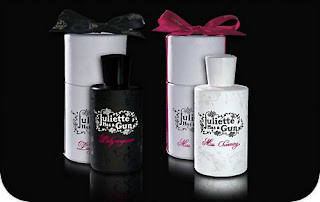Earlier this week, I dropped in at Sephora, which has become something of a pit stop for me, though it’s well out of my way and nothing in the store or about the sales staff bothers to encourage these return visits. I enter eagerly, as ever, defiantly naïve. Logic tells me there won’t be anything new on the shelves. Reason tells me the staff will again ask me to repeat the word Guerlain. Even so: I persist in the hope that something I haven’t heard of yet or have forgotten to await impatiently will be featured among the brightly lit banks of veritable has-beens.
I’d never thought about it before, but with their black outfits and their headsets and the miniature microphones the personnel at Sephora do resemble the shadowy CIA figures in conspiracy movies. You approach the perfume wall alone, with that furtive anticipation unique to the perfume-obsessed, and when you turn around, there they are, forced smiles on their faces, taking glib pleasure in having startled you. If like me you’re at Sephora frequently, the CIA agents regard you knowingly, creating the impression, along with their deportment and dress, that all the available dirt on you is filed away in a secret manila folder behind the scenes. Bought two bottles of Black Orchid three weeks ago, someone pipes into her headset from the central control room. One at this location. One across town. Returned one. Returns often. Looks suspicious. Watch him carefully.

Welcome to Sephora, they sing; can they help you? Before you can answer, they’re whispering into their microphones. Whatever they hear by way of response causes them to snicker, or causes you to suspect they’re trying not to.
Invariably, they cannot help you, and here’s why:
The odds are, they have no abiding passion for perfume. They work for minimum wage: do you expect them to chat about the difference between the various vetivers indefinitely? For most, this is a temporary job. Perhaps they’re putting themselves through school. The average employee at Kinko’s has no passion for Xerox paper, to be sure, but he is trained to operate the machinery, if not to care. Sephora probably trains to some degree. You don’t just throw a headset at someone and expect them to figure it out. You must at least show them how to untangle the chord, the existence of which, on a so-called wireless, might surprise and confuse them. Some facility with communication by headset is an asset in such an environment for several reasons:
When a customer asks whether the new Guerlain Aqua Allegoria has come in, and he seems to be speaking French, and you assume he’s a foreigner, you can simply address another CIA agent by microphone, asking her if she’s ever heard of—what was it again? When someone points out that you have no more Black Orchid left, only the Voile de Fleur, which is packaged similarly but is totally different, and yet you only have a tester for Black Orchid displayed, so that people buying Voile de Fleur will think they’re buying Black Orchid, you can call discreetly for security to have this Frenchman removed from the store. When the same man stands at the counter, spraying Fresh Index Cannabis Rose on his arm, though you’ve informed him this scent is for women, and he continues to enjoy the scent, and even sprays more, and you can’t make him stop, and it frightens you, you can whisper into your microphone, and someone from central headquarters will appear to give the guy a mean, creepy, shaming look.
This week, I was pleasantly surprised, if only slightly. The location I visited had the new Kenzo Peace, and the CIA agent I spoke to knew at least enough about the product to recognize it wasn't there the last time she looked. Surely this is progress.
I continue to be fascinated by the approach saleswomen take when selling perfume to men. Invariably, they assume I’m buying for a girlfriend or a wife, or a mistress, or my mother, or my aunt, or my grandmother, or my best friend’s dying first grade teacher, still a spinster. Anyone but myself. They converge on me like hawks because, being a guy, I must be an easy target. Like other guys, I will have zero idea what a woman wants to smell like, and will be ambivalent myself about what she should or might smell like, and will want to get this over with as soon as possible, and will buy a bottle of liquid soap if they tell me “she” would want nothing more.
When I reject the scent cards they shove my way, and tell them, just to make them stop talking, that I know what I’m looking for, I’m looking for Guerlain, and they stare at me with a bewildered look on their faces, as if I’ve just addressed them in Greek, and I explain, as if I’ve worked there myself, that Guerlain is a cosmetics line which sells fragrances as well and will typically be located somewhere not too far away, and their faces light up with recognition as if to say,
Why didn’t you say that in the first place
say that in the first place, they will insist on “escorting” me to the counter in question, and once there will not allow me to simply peruse on my own.
Once there, my escort will advise, Shalimar is very nice, as if she’s woken from a dream and suddenly knows precisely what language I’m speaking, and the woman behind the counter, resentful of the escort’s intrusion upon her sales territory, will interject, Shalimar is nice—for middle-aged women, at which point the escort, a middle-aged woman, will make her mouth very tight, and from this thin, straight line another word will not be issued.
When I visit the Estee Lauder counter, hoping to see Sensuous there but expecting not to, because I’ve called three days before and was told it won’t be in stores until the middle of July, and (behold!) there it is, I ask the henna-haired saleslady when it arrived, and she immediately launches into her sales pitch. If I make a purchase today, she says (and her tone indicates that I should, if I know what’s good for me) I will get a gift worth sixty-five dollars, and she points to a bag at the end of the counter, some tote thing, and tells me I get everything in it, reminding me again that I get everything for free, essentially, this sixty-five dollar value.
What exactly do I have to buy, I ask, suspicious. You have to buy 30 dollars worth from me, she coos. And I get a bag full of crap? I reiterate, just to make sure I’m hearing right. And just to make sure she’s hearing right, she says, “Did I just hear C-R-A-P?” I could have said shit, I point out, and she makes a tight little line out of her mouth, because, I assume, it’s hard to sell fragrance when someone brings fecal into the equation, though as my friend Bard often points out, many fragrances have the slightest whiff of tinkle. Why so surprised? If you're going to treat a man as if he just emerged from the cave, without bothering to wash his loincloth, shouldn't you expect him to talk like one?
The safest place for me is the Korean-owned shop (two locations) and the kiosk run by Russians at the mall. The Russians are blunt, and laugh when I approach, and, while we're speaking of tinkle, will pee on my leg and tell me it's raining, but I appreciate the fact that they at least pretend to know what they’re talking about. Like the Korean owner of the fragrance stores, who inherited the shop from his parents and has run it for years, the Russians have rent to pay. They want to make a sale and know the difference between a sale and a commission, the difference between finesse and a foghorn. When the Korean doesn't understand a word I'm saying, at least it's because he truly doesn't speak my language.



































